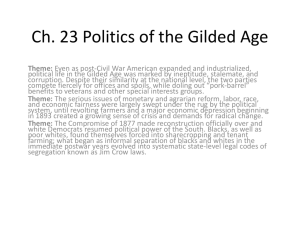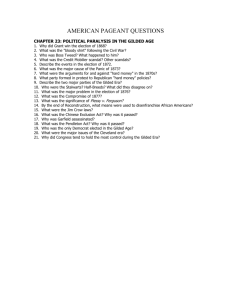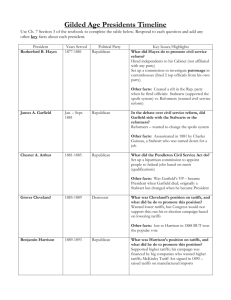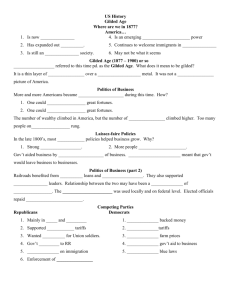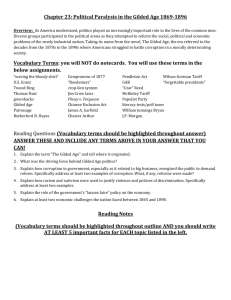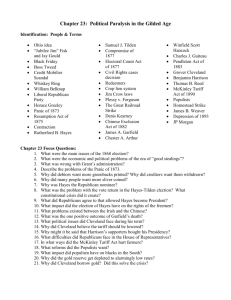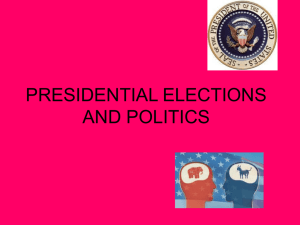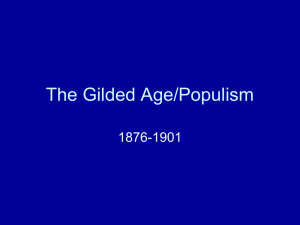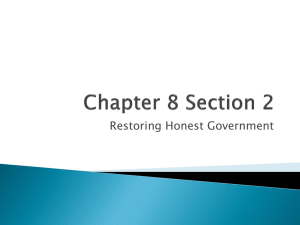Politics in the Gilded Age
advertisement
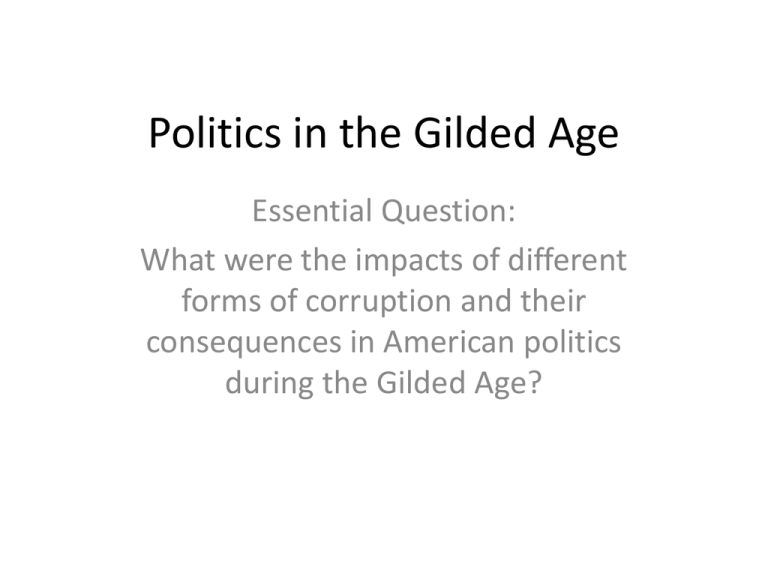
Politics in the Gilded Age Essential Question: What were the impacts of different forms of corruption and their consequences in American politics during the Gilded Age? Mark Twain describes the Gilded Age There are many young men like him in American society, of his age, opportunities, education and abilities, who have really been educated for nothing and have let themselves drift, in the hope that they will find somehow, and by some sudden turn of good luck, the golden road to fortune . . . He saw people, all around him, poor yesterday, rich to-day, who had come into sudden opulence by some means which they could not have classified among any of the regular occupations of life - From Mark Twain’s The Gilded Age Political Machine Article • Answer the following questions on a separate sheet of paper as you read through the article: – Provide evidence from the article to describe how the author define a political machine. – Analyze the purposes of the political machine and their impact on the public. – Do you think Boss Tweed’s Tammany Hall was corrupt or was he trying to help the people of his city? What evidence supports your reasoning? “Who Stole the People’ Money” • One a political machine got its candidates into office, it could take advantage of numerous opportunities for graft, the illegal use of political influence for personal gain. Patronage Spurs Reform • Presidents got increasingly frustrated with the idea of patronage, giving a political job/position to someone who helped a candidate win an election – During Andrew Jackson’s presidency, this was called the “spoils system” – Many jobs were given to under qualified people • Reformers pushed towards a merit system of hiring – Jobs in civil service, or government administration, should go to the most qualified people Ulysses S. Grant • Under President Ulysses S. Grant’s administration, 3 scandals occurred that meant more trouble for American citizens • Read through the scandals Reform Under Presidents Hayes, Garfield, & Arthur • Rutherford Hayes (R), elected in 1876, could not convince gov’t to support reform, so he took matters into his own hands – Named independents to his cabinets – why do this? – Set up a commission to investigate the nation’s customhouses, notorious centers of patronage – Fired two top officials of New York’s customhouse • Enraged the Boss Roscoe Conkling and republicans who ran the house called the Stalwarts – He did not go out for re-election in 1880 leading to a free for all at the Republican convention that year headed by the Stalwarts James A. Garfield • Since the Stalwarts and the reformers could not come to an agreement at the convention, everyone settled on Independent candidate James A. Garfield – Garfield leaned more towards the reformers – To balance this out, V.P candidate Chester A. Arthur was named who was a supporter of Boss Conkling • Despite this, most civil service jobs went to reformers, angering the Stalwarts more Chester A. Arthur • On July 2, 1881, as President Garfield was walking through the D.C. train station, he was shot twice by a member of the Stalwarts – He exclaimed “I did it and I will go to jail for it. I am a Stalwart and Arthur is now president.” – The man was overlooked for a job he was hoping to get despite his lack of qualification • Garfield died of his wounds on September 19th • Despite his ties to the Stalwarts, Arthur turned reformer after having worked along side Garfield, and the assassination Pendleton Civil Service Act of 1983 • In response to Garfield’s assassination, Arthur’s first request to Congress was to pass this act • Under the act, a bipartisan service commission could make appointments to federal jobs through a merit system based on candidate’s performance on an examination • Effects: – Public admin. became more honest and efficient – Because officials could not milk employees for money, politicians turned to other sources for donations Harrison, Cleveland, and the High Tariffs • If you cannot get campaign contributions from independent people, who do you turn to? – Big Business! – In return, they hoped gov’t officials would raise tariffs – what is a tariff? • Restriction on trade • Problem – tariffs raise prices of goods for consumers • In 1884, the Democratic Party won (1st time in 28 yrs) with Grover Cleveland – He tried to lower tariffs, but congress refused at every turn Election of 1888 • In 1888, Cleveland ran for re-election on a lowtariff platform • His opponent was Benjamin Harrison, the grandson of President William Henry Harrison – His campaign was funded by big businesses, of course, wanting high tariffs • Cleveland won the popular election by 100,000 votes, but Cleveland won the electoral college – His first action was the McKinley Tariff Act raising tariffs to higher rates than ever before Election of 1892 and 1896 • Cleveland ran for election again in 1892 and won, the only president in history to serve two nonconsecutive terms – What do you suppose his first action was? • In 1896, William McKinley (as in McKinley Tariff Act) was inaugurated as president – And what do you suppose he did? • Despite the failed attempt at reducing tariffs, the American people wanted reform, they would see some at the turn of the century Politics in the Gilded Age Answer the Essential Question: What were the impacts of different forms of corruption and their consequences in American politics during the Gilded Age?
